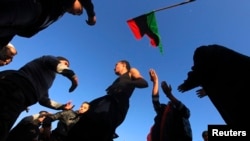TRIPOLI —
Libyan lawmakers are debating a proposal to ban associates of former dictator Moammar Gadhafi from public office. Protesters outside Tripoli's Rixos Hotel, where parliament meets, say the issue is clear-cut: those who profited from the 42-year Libyan dictatorship should not be allowed to benefit from the revolution.
In parliament, the issue is more complicated. Lawmakers have delayed voting until next week, as debate rages both in formal session and informally in the hotel’s restaurants, coffee houses and even in the Turkish steam rooms.
Critics argue the measure is unclear and would even prohibit those with remote ties to the former government from holding office or working for state institutions for 10 years. The disenfranchised include journalists, university professors and bank managers.
Member of parliament Omar Khaled Obedy argues the new Libya should be free of any Gadhafi taint.
“These people worked for more than 42 years with the old system," he says. "We have to exclude all. Our law is not to kill these people, but you have to exclude these people from political life. It will be life in the civil life. You can stay in Libya, no problem.”
Opponents aruge that, if the law passes, the new Libya will operate much as the old one did, copying Gadhafi's practice of excluding from public life the people he deemed undesirable.
It would also undermine efforts to unite the country and usher in reconciliation, says lawmaker Abdurahman Al-Shater.
“I feel we don’t need it for the time being because Libya is not civilized yet and we don’t want more enemies for the revolution of February 17th," Al-Shater says. "It is very harmful for Libya and will divide the people. It won’t serve us for social reconciliation. We don’t want to repeat what happened in Iraq.”
Parliament member Mohamed Saad, who worries the draft exclusion law is too broad, says that exclusion should be reserved to those who were involved in provable misdeeds during the previous government, and not based on the positions they occupied.
“We will try to not let these rules, this law not to go like this because it is not fair, because there are many people there in positions but they didn’t like Gadhafi, they are against Gadhafi," he says. "My idea is that it should go with the behavior, not the positions.”
Further complicating the issue, political opponents of the measure, led by centrist leader Mahmoud Jibril, a Gadhafi-era reform-minded planning minister, have introduced another category of people for proposed exclusion: those who hold dual nationality.
That would prohibit many returning exiles from holding political positions, including many current lawmakers who want Gadhafi-era politicians out of public life.
In parliament, the issue is more complicated. Lawmakers have delayed voting until next week, as debate rages both in formal session and informally in the hotel’s restaurants, coffee houses and even in the Turkish steam rooms.
Critics argue the measure is unclear and would even prohibit those with remote ties to the former government from holding office or working for state institutions for 10 years. The disenfranchised include journalists, university professors and bank managers.
Member of parliament Omar Khaled Obedy argues the new Libya should be free of any Gadhafi taint.
“These people worked for more than 42 years with the old system," he says. "We have to exclude all. Our law is not to kill these people, but you have to exclude these people from political life. It will be life in the civil life. You can stay in Libya, no problem.”
Opponents aruge that, if the law passes, the new Libya will operate much as the old one did, copying Gadhafi's practice of excluding from public life the people he deemed undesirable.
It would also undermine efforts to unite the country and usher in reconciliation, says lawmaker Abdurahman Al-Shater.
“I feel we don’t need it for the time being because Libya is not civilized yet and we don’t want more enemies for the revolution of February 17th," Al-Shater says. "It is very harmful for Libya and will divide the people. It won’t serve us for social reconciliation. We don’t want to repeat what happened in Iraq.”
Parliament member Mohamed Saad, who worries the draft exclusion law is too broad, says that exclusion should be reserved to those who were involved in provable misdeeds during the previous government, and not based on the positions they occupied.
“We will try to not let these rules, this law not to go like this because it is not fair, because there are many people there in positions but they didn’t like Gadhafi, they are against Gadhafi," he says. "My idea is that it should go with the behavior, not the positions.”
Further complicating the issue, political opponents of the measure, led by centrist leader Mahmoud Jibril, a Gadhafi-era reform-minded planning minister, have introduced another category of people for proposed exclusion: those who hold dual nationality.
That would prohibit many returning exiles from holding political positions, including many current lawmakers who want Gadhafi-era politicians out of public life.




